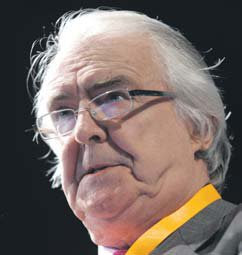 If giving is presumably the road to paradise,
If giving is presumably the road to paradise, then is taking the stairway to hell?
Asks Cambridge University’s Prof Charles Hampden-Turner
THE GENEROSITY TRAP:
Single-minded' giving does nothing to help the needy.
SINGAPORE (Today), October 31, 2007:
It seems natural: When someone is in need, you give him or her money. But can the act of giving cause even more problems, trapping the poor in their poverty?
Tackling this question yesterday at the second National Volunteerism and Philanthropy and Corporate Social Responsibility Conference, keynote speaker Charles Hampden-Turner asked: "If giving is presumably the road to paradise, then is taking the stairway to hell?"
The Cambridge University senior research associate and veteran of America's "war on poverty" has spent 40 years studying such dilemmas. He has found one of the main problems for charitable organisations is "single-minded" giving, which breeds passivity and single-minded taking.
"Are we not rewarding, after a fashion, their very failure, when most of us get rewarded for our successes?" he asked.
One example is the welfare system where one must prove total incapacity and be a
"100-per-cent certified slob" in order to qualify for handouts, he said. Instead of penalising welfare-takers for finding jobs, allow them to pool their welfare money to start a small business or give something back to the community.
And one dilemma is that the race for aid engenders an "upside down world" where people "race to the bottom" to "prove more wretchedness than anyone else" to garner sympathy. There is also the issue of organisations overlooking basic and less glamorous projects like sanitation.
The act of giving should be coupled with the expectation of reciprocity - a principle that will reconcile these dilemmas, and return dignity to the people at the receiving end, said Professor Hampden-Turner.
"Whatever is given to the poor should enable them to give back in some way or give to others," he said.
Micro-financing, for example, through the highly successful Grameen Bank, empowers village women in Bangladesh by offering them small loans to start businesses.
"(It) even makes those struck by earthquake, wind and fire repay. The bank will ease and extend the terms of loan, but not to repay means that the money cannot be lent to others," he said.
This fosters a sense of resilience and community.
The bank requires that clients borrow in groups of five as a form of mild social pressure to repay. This has resulted in an amazing 97-per- cent repayment rate, said Prof Hampden-Turner.
Speaking to Today he said: "This relationship of reciprocity and mutuality is much more effective than any other type of relationship."
Non-government organisations (NGOs) too, should take the same collective approach, he said. They can go into areas banks cannot, so they should cooperate.
"Why don't they look for reliable people in poor towns or villages and introduce them to banks? And why shouldn't the bank give the NGO money for every satisfactory client they locate?" he asked.
"We should be trying many more experiments. Seventy-five per cent of all new start-ups fail, but people still go on. The same should apply to social entrepreneurship and innovation. If three out of 10 work, we're still better off."
By Sheralyn Tay
Copyright: Mediacorp
